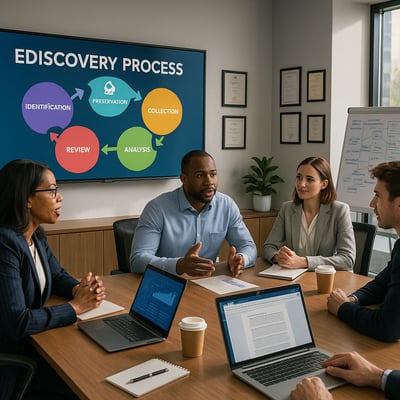" Cut Through the Digital Clutter: Why eDiscovery Is No Longer Optional \n In today’s legal...

Every week, the Array team reviews the latest news and analysis about the evolving field of eDiscovery to bring you the topics and trends you need to know. This week’s post covers the week of May 27-June 2. Here’s what’s happening.
Last week we wrote about a judge granting a defense motion to amend the ESI Order in the case in re StubHub Refund Litigation to remove the requirement that hyperlinked documents must be produced as if they were attachments to emails. Now this motion has been cited, successfully, by the defense in re Insulin Pricing Litigation.
In StubHub, after stipulating to a requirement to produce hyperlinked documents as if they were attached to emails, the defense provided good cause as to why it couldn’t comply with the order and moved for relief. In Insulin Pricing Litigation, the defense and plaintiffs couldn’t agree on several ESI issues, including hyperlinks.
The plaintiffs argued to U.S. Magistrate Judge Rukhsanah L. Singh that a producing party should produce linked documents with any affiliated family group. The defendants contended that would be technologically infeasible, would conflict with ESI protocols for prior insulin pricing cases, and would create undue and disproportionate burdens.
Singh agreed with the defense, writing “hyperlinks are not the same as traditional attachments,” citing Nichols v. Noom Inc., and adopted the defendants’ proposed language regarding family relationships and hyperlinks in the ESI Protocol. Singh also said the parties shall meet and confer as to the feasibility and burden of applying the commercially available tools to collect hyperlinks as family attachments for parties other than Defendants that would be subject to the ESI Protocol.
While the StubHub and Insulin matters show that parties can seek relief from courts if they lack a technological solution to collect hyperlinked documents like traditional attachments, eDiscovery partners like Array have methods and techniques to manage the challenges and complexities of modern attachments and tackle production requests.
The Sedona Conference recently published its post-public comment version of its Commentary on Privilege Logs, which is available for a free download.
According to the authors, the primary conclusions include:
Other recent eDiscovery news and headlines:
With a decade of expertise, Julia excels at optimizing enterprise eDiscovery workflows from start to finish. With a deep understanding of how to seamlessly integrate workflows across various eDiscovery platforms, Julia creates tailored solutions for data identification, legal holds, ESI collections, and productions. By harnessing the power of Technology Assisted Review and Analytics, she delivers efficient, cost-effective results that align with best practices and budgetary constraints. Julia’s exceptional communication and customer service skills have fostered strong, lasting relationships with both clients and Project Management teams, enabling her to effectively problem-solve and drive success across numerous projects.

" Cut Through the Digital Clutter: Why eDiscovery Is No Longer Optional \n In today’s legal...



Every week, the Array team reviews the latest news and analysis about the evolving field of...